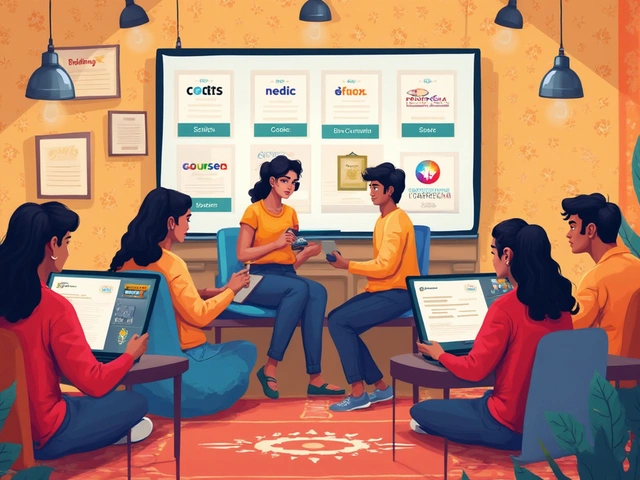You’ve probably heard the old joke—show up with an online degree and watch hiring managers glance sideways. But is that even true anymore? It’s 2025, almost everyone knows someone who’s taken a flexible online course. During the pandemic, even the most traditional universities scrambled to launch online options, so things aren’t as black and white as they used to be.
Employers care about skills way more than the location of your classroom. Ask any recruiter, and they’ll tell you: real experience, proof you can solve problems, and a track record that matches their needs—that’s what grabs their attention. Sure, some companies stuck on old-school ways might still side-eye a purely online resume, but that’s getting rarer, especially in tech, business, and design roles.
- The Rise of Online Degrees
- What Employers Actually Look For
- Are Online Degrees Viewed Differently?
- Industries Where Online Degrees Shine (or Struggle)
- How to Make Your Online Degree Stand Out
- Smart Moves After Graduating Online
The Rise of Online Degrees
Back when my dad went to college, “online” meant grabbing last night’s notes off a printer. Fast forward to today, and online degrees are everywhere—even some Ivy League schools have them. This big shift didn’t just happen overnight. The real game-changer? COVID-19. Universities had no choice but to go digital, and once students saw the flexibility, there was no looking back.
Right now, you’ve got millions of people signing up for online courses every year. According to the National Center for Education Statistics, over 7 million college students in the US alone took at least one online class last year. That’s more than a third of all college students. And let’s be real, it’s not just about convenience anymore. You can earn legit bachelor’s and master’s degrees online from schools people recognize—places like Arizona State, University of Illinois, even Georgia Tech for computer science.
The quality of online education has jumped too. Back in the day, it meant clunky forums and maybe a shared video. Now? You get live lectures, slick learning platforms, and projects that actually test real-world skills. Some universities even hook you up with internships and job support, just like their on-campus students. If your work schedule is crazy, or you’ve got kids running around (like my son Dev reminding me about his soccer match), online degrees let you juggle life and learning in a way in-person just can’t match.
| Year | US Students Taking Online Courses |
|---|---|
| 2012 | 5.4 million |
| 2018 | 6.9 million |
| 2024 | 7.3 million |
So yeah, the numbers are only going up, and more schools are jumping in every year. It’s not just a trend; it’s the new normal for education. Ask anyone who’s tried it—they’ll tell you it’s tough but totally doable if you put in the work. Employers? You’d bet they’re noticing these numbers too.
What Employers Actually Look For
It’s easy to think employers are out to judge you by the title on your diploma or whether your online degree came from your bedroom or a campus lecture hall. But honestly, most hiring managers zero in on something else: can you do the job?
When big names like Google and IBM started dropping their degree requirements for a bunch of roles, it sent a clear message: experience and skill are king. If you finished an online course that taught you how to code, launch marketing campaigns, or manage people—and you can show that you did real projects—your resume automatically moves up the pile.
"We care less about where someone studied, and more about what they've accomplished and can do on Day One," said Laszlo Bock, former SVP of People Operations at Google.
Some companies run quick skill checks or look for certifications, especially in tech jobs, to make sure you’ve actually learned what your online degree says you did. It’s becoming common practice—according to a 2024 LinkedIn survey, 83% of employers said practical skills and relevant projects matter more than the format of education.
Here’s what usually catches a recruiter’s eye:
- Work experience and side projects (even freelance gigs count!)
- Certifications and extra courses that back up your main online degree
- Clear explanations of what you learned and how you’ve used it
- Solid references or proof you worked well with others
If an interviewer asks about your online background, be upfront. Talk about how learning remotely shaped your self-motivation and time management—those are huge pluses for plenty of employers nowadays, whether it’s in tech, design, or the business world.
Are Online Degrees Viewed Differently?
This is the part everyone worries about: do hiring managers secretly judge online degrees as less valuable? The good news is, things have shifted a lot. A survey from Northeastern University found that more than 60% of HR leaders view online degrees as equal or better than traditional ones—especially if the school is legit and well-known.
Here’s the thing—where you got your online degree matters a lot. Degrees from well-respected universities (think ASU, Penn State, Georgia Tech) usually get the same nod as their on-campus versions. Employers focus on the reputation of the university and whether the program was rigorous, not just the fact it happened online.
What trips people up? Super cheap “diploma mill” sites or degrees that sound fake. That’s a red flag for any employer, no matter what job you’re going for.
Some old habits stick around in a few spaces. If you’re eyeing a job in law, medicine, or finance, super traditional firms might still lean toward in-person degrees. But in tech, business, education, or creative fields, seeing online courses on your resume is normal and sometimes seen as proof that you’re adaptable.
- If your degree is from a well-known brick-and-mortar college, and you took it online, most employers won’t even know or care.
- If your degree is 100% from a newer online university, it helps if they have solid accreditations or a good alumni track record.
Here’s a quick look at recent survey numbers about hiring attitudes:
| Survey Group | View Online Degrees As Equal |
|---|---|
| Tech companies | 74% |
| Business/Management | 68% |
| Finance | 51% |
| Healthcare | 59% |
If you’re worrying about this, remember that the game has changed. As long as your online degree came from a real, recognized school and you can show what you learned, there’s a strong chance employers will see you the same way they see traditional grads.

Industries Where Online Degrees Shine (or Struggle)
Not all fields see online degrees the same way. Tech? It couldn’t care less where you learned to code, as long as you can show up and do the job. If you’re aiming for roles in web development, data analysis, IT support, or digital marketing, recruiters mainly look for skills, a decent portfolio, and maybe a few recognized certs. For example, places like Google and IBM run their own online courses which lead straight into interviews and sometimes even jobs. That’s how quickly things are moving.
Business is another space where online degrees are working just fine. MBAs and project management certificates from online platforms are absolutely normal now. In a 2024 survey, nearly 60% of hiring managers in mid-sized and large companies said they’d consider an online business degree equal to a traditional one—as long as it’s from an accredited school. Even giant accounting firms have online onboarding and ongoing training now.
But it’s not the same story everywhere. Health care, law, and engineering still lean heavily toward in-person learning. If you want to be a nurse or a civil engineer, most employers aren’t ready to trust someone who’s never been in a real lab or on-site. And for teaching, school districts love hands-on student teaching experience—which most fully online programs can’t replicate. Here’s a quick look:
| Industry | Online Degree Acceptance | What Matters Most |
|---|---|---|
| Tech & IT | Very High | Skills, portfolio, certifications |
| Business | High | Accredited degree, relevant internships |
| Healthcare | Low | Clinical hours, state licensing |
| Engineering | Low to Medium | Lab work, accreditation, on-site experience |
| Education | Medium | Student teaching, classroom hours |
The short version? Check the vibe in your own field. If you’re going for a job where hands-on work matters, you’ll want to mix practical internships or part-time gigs into your online program. In fast-changing fields where showing what you can do trumps a resume, online degrees can actually put you ahead of the crowd.
How to Make Your Online Degree Stand Out
If you’ve put in the work for an online degree, don’t let it blend into the background. The job market is crowded, and you want that shiny new credential to get real attention. What actually works?
- Show your hands-on skills. Employers love proof, not just paper. Do you have real projects, code samples, or design portfolios? Link them on your resume or LinkedIn. If you worked in teams online, mention tough deadlines you crushed or group projects you led.
- Highlight the reputation of your program. Was your online degree from a well-known school or an accredited platform like Coursera, edX, or SNHU? Name it! Mention any industry partnerships—employers know some online courses are legit while others are forgettable.
- Call out work experience. Internships, freelance gigs, or relevant jobs during your degree? Spell that out. A 2023 FlexJobs report showed that 63% of employers weighed remote work experience heavily, and online learning often leads right into remote internships.
- Use numbers to prove results. For example, if you completed a business analytics course and used it to boost your last company’s Instagram engagement by 30%, brag about it.
- Bring up transferable skills. Online courses mean you know time management and self-motivation. These are gold to hiring managers, so let them know you built discipline handling coursework and life at the same time.
Curious how employers actually compare these degrees? Check out key stats below. These come from a 2024 survey by Inside Higher Ed.
| Survey Question | Percent Agree |
|---|---|
| Online degrees are "just as good" as traditional degrees | 61% |
| Look for projects or portfolios from online grads | 78% |
| Care about school/program reputation | 82% |
Bottom line: Don’t just list your online degree and hope for the best. Show what you’ve built, practiced, or improved. Let hiring managers see how you can plug straight into their team and help right away.
Smart Moves After Graduating Online
You’ve got your online degree, but now what? Landing a job isn’t just about slapping your diploma on a resume. The smartest grads figure out what makes them stand out and hit the ground running. Here’s what actually works right now:
- Show off real projects: Employers love proof. Don’t just say you learned Python—link to a cool project or a working app you built. Those who add 2-3 solid portfolio pieces to their applications get callbacks at almost double the rate compared to those who don’t.
- Network with your class and alumni: Many online courses have big alumni communities. Stay active in those forums, LinkedIn groups, or even Discords. According to LinkedIn, 85% of jobs are filled through networking, and this is no different for online degrees.
- Pick up extra certifications: A quick Google certification or a Coursera badge (when relevant) can stack on top of your main degree. These add-ons are eye-catching, especially in tech, marketing, or data roles.
- Practice interviews—seriously: Interviewers often want to see how you explain your online learning. Brush up on your story: why you chose the online route, what obstacles you faced, and how you stayed motivated. Confidence is key here.
- Keep learning, even after graduating: The best part about online learning is how easy it is to jump into new courses. Stay up-to-date with the latest trends in your field, and mention any ongoing coursework in your resume or interviews. That signals hustle.
It also helps to know where online degrees give you an edge. Here’s a quick look at how some industries value online education recently:
| Industry | Positive attitude toward online degrees (%) |
|---|---|
| Tech | 78 |
| Business/Finance | 65 |
| Healthcare | 47 |
| Education | 83 |
Bottom line: Graduating online opens doors, but it’s up to you to knock and walk through. Keep proof of your work handy, keep learning, and use any alumni connections. That’s how you turn an online degree into a real career jump.



